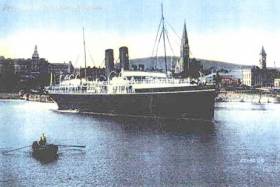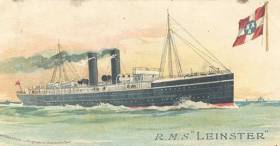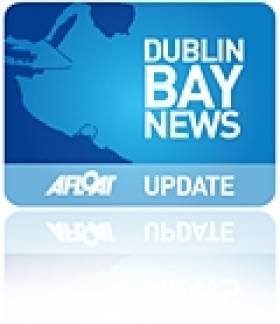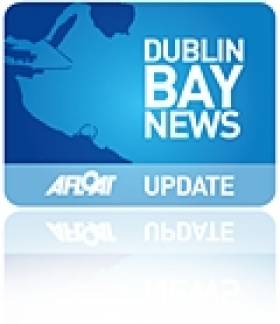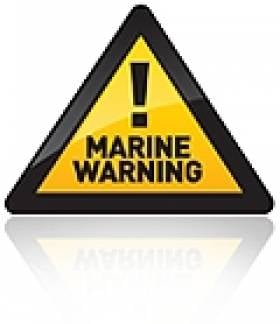Displaying items by tag: Kish Bank
A €1.5 billion offshore wind farm stretching from Booterstown to Greystones could generate enough electricity to power 600,000 homes.
The Irish Times reports on proposals by an Irish-German partnership for the ‘Dublin Array’ offshore energy venture that could see as many as 100 wind turbines installed over 2,440 hectares, partly in Dublin Bay.
Saorgus and Innogy are now seeing a foreshore licence to conduct surveys in the intended locations of the Kish Bank and Bray Bank.
Pledges have been made to work with shipping companies, fishing interests, sailing clubs and other water users during this process, as the venture promises a “meaningful approach to supporting local communities”.
It is also hoped that the project would benefit from new Government supports guaranteeing revenue for renewable energy generators, a scheme which is currently under EU scrutiny.
The Irish Times has much more on the story HERE.
Flotilla from Dun Laoghaire to Head to RMS Leinster Wreck Site off Kish Bank Tomorrow–Centenary Day
#rmsLeinster - A request from the Mail-Boat Leinster Centenary Committee for use of the Naval Service largest patrol vessel to carry out a wreath-laying ceremony at the wreck site off the Kish Bank tomorrow has been declined, writes Jehan Ashmore.
A Naval Press Office spokesperson commented to Afloat.ie that the LÉ Eithne is scheduled for a self-maintenance period during that time and is therefore not available. The self-maintenance is of a routine nature and would have been scheduled last year.
Instead LÉ Orla, a coastal patrol vessel (CPV) has been assigned to carry out duties off the Kish Bank tommorrow morning though on behalf of the navy. Despite the efforts of the Committee they were unable to secure use of the CPV too as the Naval Service did not permit bringing family relatives out to the wreck site of the RMS Leinster. The wreck lies on the seabed in a depth of 28m.
Instead the Committee has chartered Dublin Bay Cruises St.Bridget to bring the relatives. The excursion vessel is to depart tomorrow morning at 07.00 from the jetty at the East Pier, Dun Laoghaire. In attendance will be the Dun Laoghaire Lifeboat though at time of writing confirmation awaited from the Irish Coastguard to send out a helicopter too.
The 100th anniversary tomorrow morning is to mark the tragedy when more than 500 lives were lost from RMS Leinster which having departed Kingstown (Dun Laoghaire) bound for Holyhead, Wales was struck by a German U-Boat torpedo in WW1. This was the single-largest loss of life on the Irish Sea and all the more poignant, given the disaster took place within weeks before the Great War ceased in the following month. For a related story on the City of Dublin Steam Packet operated Royal Mail Steamer (RMS) Leinster click here.
On completion of the offshore centenary commemorative ceremony the flotilla will return to Dun Loaghaire Harbour around 09.00hrs. This will include the LÉ Orla though the CPV will not be made open to the public.
On shore events are planned throughout the day. An Ecumenical Service at 09.30 is to be held in St. Michael's Church on Marine Road. An Official State Commemoration to mark the tragedy of the sinking of RMS Leinster takes place at 11.00 at Moran Park adjacent the dlr Lexicon Library.
For futher information click here and also this link.
The reason why the Mail-Boat committee requested the LÉ Eithne was because the largest vessel in the 8-strong fleet could easily accommodate the relatives out to the wreck site north of the Kish Bank Lighthouse.
Afloat adds that LÉ Eithne has a spacious aft-deck space and a helicopter hanger. In addition the patrol vessel is aptly twinned with the town of Dun Laoghaire.
A second trip by St. Bridget out to the wreck site is to be held tomorrow afternoon at 15:30. This is to facilitate a further 100 families related to the tragedy, most of them living overseas will have their opportunity to visit the site off Dublin Bay, from where RMS Leinster departed Kingston (Dun Laoghaire) a century ago tommorrow on 10th October 1918.
RMS Leinster - Centenary Calendar of Events In October
#RMSLeinster - Centenary events to mark the tragic sinking of RMS Leinster in the Irish Sea during WW1, continue into next month in Dun Laoghaire, notably on 10 October, the day the 'mail-boat' 100 years ago was struck by a German U-Boat torpedo leading to a major loss of life.
On that infamous date in 1918 of Irish maritime history – the RMS Leinster operated by the City of Dublin Steam Packet had set off from Kingstown (Dun Laoghaire) bound for Holyhead, Wales. On board there were 77 crew among them postal-workers and 694 passengers.
The tragedy which struck the 'mail-boat' took place to the east of the Kish Bank lightship when submarine UB-123 torpedoed the ship, leading to the loss of more than 500 lives. To this day the incident remains as the single greatest loss of life in the Irish Sea.
RMS Leinster was one of a quartet named after the provinces of Ireland and the steam packet company was contracted the Royal Mail Service, hence the 'RMS' prefix designated to the ship's name. At the time of the disaster, the twin-propelled ship was camouflaged through paint effects and armed with one 12 pounder and two signal guns.
RMS Leinster Centenary Events
Events to commermorate the RMS Leinster will be held throughout Dun Laoghaire-Rathdown and is organised by the The Mail Boat Leinster Centenary Committee. To consult the centenary events click here from the 'yellow' brochure. For further news updates, click this link.
Among the various event venues, they include the National Maritime Mussuem of Ireland which is hosting a RMS Leinster exhibition. The museum has a detailed listing of events and activities including links providing further detailed information.
Also available is a calendar of events click here for the 'blue' brochure with front cover depicting RMS Leinster.
The museum located next to the dlrLexicon Library (also holding events) aptly overlooks the Carlisle Pier, from where the RMS Leinster departed on its fateful final crossing.
Portrait of R.M.S. Leinster Survivor to be Unveiled
#DUBLIN BAY NEWS-Tom Connolly, a survivor from R.M.S. Leinster which was torpedoed off the Kish Bank in 1918, will be remembered when his portrait is unveiled on 31 December.
The unveiling is to take place in the Dun Laoghaire Club, 1 Eblana Avenue, where live music will be the order of the night, starting at 8.30pm. Tickets costs €10 each and can be purchased from the club bar or Costello Jewellers on Cumberland Avenue. Proceeds will be used to provide wheel-chair access to the club.
R.M.S. Leinster was operated by City of Dublin Steam Packet Company (CDSPCo) and on the day of the incident she had 771 passengers (mostly military personnel) and crew on board. Of those 22 were postal sorters from the Dublin Post Office, working in the ships on postal sorting room. The prefix of the vessel, R.M.S. stood for Royal Mail Steamer.
Officially 501 people died, making it both the greatest ever loss of life in the Irish Sea and the highest ever casualty rate on an Irish-owned vessel, though research to date has revealed the names of 529 casualties. To read more click HERE.
Connolly was also a member of the Dun Laoghaire Club and he founded Ireland's first supermarket in Patrick Street, Dun Laoghaire. A model of R.M.S. Leinster was displayed in his supermarket over many years. The model is now in the town's National Maritime Museum of Ireland which is due to re-open in Easter next year, for further information www.mariner.ie
Courtown Harbour Rowing Club took second place in a time of 3:3:19 and third place honours went to Stella Maris Rowing Club with a time of 3:16.00. The hosts of the Hobblers Challenge, St. Michaels Rowing Club based out of the Coal Harbour, passed under the high walls of the East Pier Lighthouse and battery some two minutes later in fourth place.
The annual event (for race-route click HERE) was only re-introduced onto the race calendar last year after a break of several years. The skiffs were launched at the Coal Harbour slipway where they headed over to line-up for the starter's gun opposite the Hobbler's Memorial located on the publicly accessible Eastern Breakwater which is between the Stena Line HSS fast-ferry berth and the Dun Laoghaire Marina.
In attendance to greet the start of the race in memorial of the Dublin Bay hobblers was the RNLB Anna Livia of the local RNLI lifeboat station. The bronze memorial depicts a tower of lifejackets in commemoration of three young Dun Laoghaire hobblers who after piloting and unloading the schooner Jealous of Me in Ringsend, failed to return home.
This occupation was carried out by men also from Ringsend, Dalkey and other harbours and it was the first crew to reach a ship and throw a hook on the deck who would win the business of pilotage and unloading in Dublin Port.
Crews would think nothing of rowing out to the Kish Bank on the hope of spotting a ship. If they waited offshore and no passing trade appeared along the East Coast the craft doubled as a bed if it became too late to row home. The craft were much larger and heavier compared to the present day skiff and it is in these oarstrokes that the Hobblers Challenge follows the original race of the hobblers during the 18th and 19th centuries.
It was apt that on the same day of this year's Hobblers Challenge, the 107-year-old ketch Bessie Ellen, a former cargo-carrying vessel that represented one of the last such sail-trading ships operating in the Irish Sea, was making a passage to the east of the Kish Bank.
To read more about the un-manned Kish Lighthouse click this HERE, and for the 150 cargo tons capacity ketch built in 1904 click HERE.
- Dublin Port
- Fishing
- Dun Laoghaire Marina
- Dublin Bay News
- Irish Lights
- Dun Laoghaire Harbour
- Kish Bank
- Ferry news
- Stella Maris Rowing Club
- Kish Lighthouse
- East Coast skiffs
- Dun Laoghaire Harbour and news
- Stena Line HSS Dun Laoghaire
- Hobblers Challenge
- Dublin Bay pilots
- Rowing news
- Coal Harbour Dun Laoghaire
- St. Michaels Rowing Club
- Courtown Rowing Club
- St.Patricks Rowing Club
- Ringsend skiff clubs
Lecture: "Diving The Wreck of the Bolivar on the Kish Bank"
The talks proper will begin at 8 pm but the organisers are encouraging those wishing to attend to assemble at 7.15 pm for a socialable drink in advance of the talk starting. All are welcome and the admission is free, noting a donation for the RNLI will be held at the door. For further information about the DBOGA logon to www.dublinbayoldgaffersassociation.com/
The Poolbeg yacht clubhouse is located on the South Bank, Pigeon House Road, Ringsend which can be accessed from the Sean Moore Road that connects the Merrion Strand Road (from the south) and the East-Link Toll Bridge (from the north). For information in general about the PYBC Tel: (01) 668 9983 or logon to www.poolbegmarina.ie/
Tony O'Reilly to drill Dublin Bay for oil?
“We are delighted to confirm that our ongoing analysis of the Kish Bank Basin has revealed the presence of a large untested structure that warrants further investigation," said O'Reilly.
"The Dalkey Island exploration prospect presents the potential for a large oil accumulation in shallow water off the east coast of Ireland. The partners have agreed on a focused work programme aimed at further de-risking this prospect, prior to any drilling programme."
The company, a partner of Malaysian Petrol outfit Petronas, has also identified the bank as a prospect for carbon sequestration storage, with a capacity of up to 270 million tonnes of gas.
A link to the full release is here. (pdf download)


